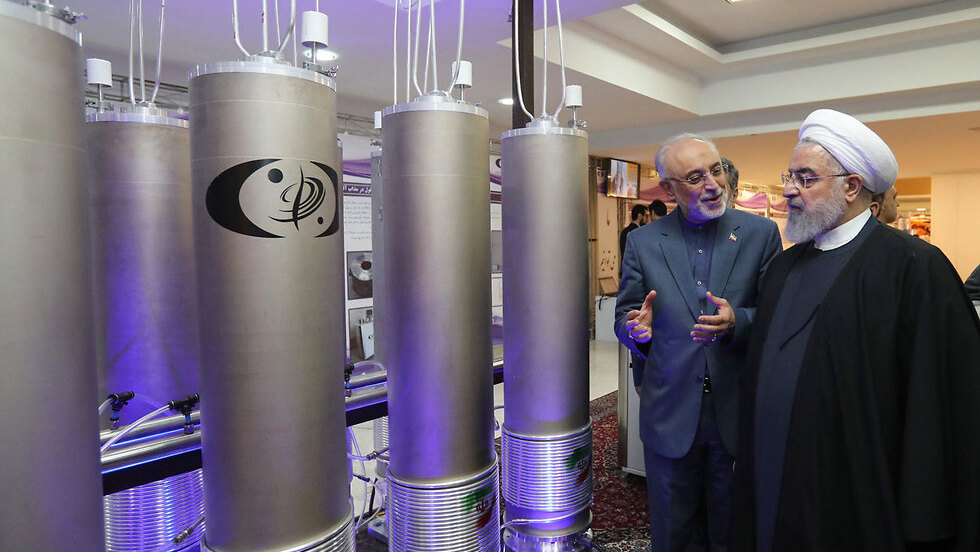Israel and the Sunni Arab world have experienced some anxiety over the election of U.S. President Joe Biden, primarily due to the anticipated negotiations between his administration and Tehran over the agreement to limit Iran's nuclear activities that was brokered in 2015 by Barack Obama and abandoned in 2018 by Donald Trump.
The biggest concern is that the negotiations between Washington and Tehran will only serve to give the Islamic Republic a confidence boost, encouraging it to further entrench itself across the Middle East through its various proxies.
4 View gallery


The flags of the United States, Israel, United Arab Emirates and Bahrain are projected onto the wall of the Old City of Jerusalem following the announcement of the Abraham Accords
(Photo: Reuters)
But this is not the sole cause of concern, with each state having its own particular set of worries.
Jerusalem fears that, unlike Trump and his cozy pro-Israel policies, the Biden administration will have a far more draconian approach to the conflict with the Palestinians.
Meanwhile in the Arab world, especially in Egypt and the Gulf states, there is a growing fear that America will endorse the advancement of democracy and human rights in Arab countries in a way that serves to weaken the authority of certain leaders.
What comes to mind is Obama’s 2009 speech in Cairo about the furtherment of comprehensive reforms in Arab countries. Many believe that it was this speech that served as the kindling for the wildfire of the 2011 Arab Spring.
It is for this reason that several Arab countries are doing all they can to turn down the heat on regional crises that could possibly trigger some friction with the Biden administration.
The Saudis, for example, elected to end their protracted crisis with Qatar sans any noticeable achievement.
Several other Arab countries have also begun working to develop or otherwise strengthen their lobbying efforts in Washington, all while attempting to improve their public and political image in the United States, mainly among Democrats.
All of this is geared at finding favor with the Biden administration, which entered the White House with a strategy based on a set of stringent views and ideologies - mainly concerning Iran.
And while it seems as though the strategy of this new administration is indeed set in stone, Israel and the Sunni states may yet succeed in changing the new administration’s attitude towards Tehran, embarking on joint effort to emphasize the potential dangers of giving Iran too much power.
This will almost certainly be a better strategy than expressing harsh criticism of the new White House or projecting unending waves of anxiety.
4 View gallery


Iranian President Hassan Rouhani inspects one of the country's nuclear facilities sites
(Photo: AFP)
The Arab world’s concern about the new U.S. administration can also be leveraged to improve the reality of the Palestinian people - and by extension Israel.
Countries like the UAE and Saudi Arabia can be persuaded to deepen their influence and involvement in the Palestinian political system, mainly through economic assistance, which will surely paint them as a benevolent presence in the eyes of the U.S.
Employing the assistance of the Gulf states with the Palestinians will also create competition for Qatar, which on the one hand attempts to stabilize the Palestinian arena with financial aid, but on the other is in a strategic alliance with the Hamas terrorist organization and Turkish President Recep Tayyip Erdogan.
Their aid will also strengthen the stability of the Palestinian Authority’s government and improve the overall quality of life for the people in the Palestinian territories, calming the West Bank and paving the way for more amicable negotiations between the PA and Israel.
4 View gallery


Qatari envoy to the Gaza Strip Mohammed al-Emadi visits the coastal enclave
(Photo: AFP)
Israel and the Arab world now stand together as a new era begins in Washington.
And while the next four years may be tougher and less flexible than the days of the Trump administration, this new government is by no means a threat.
It may actually be the best solution for issues such as the Palestinians, which are growing more and more complicated with each passing day.


